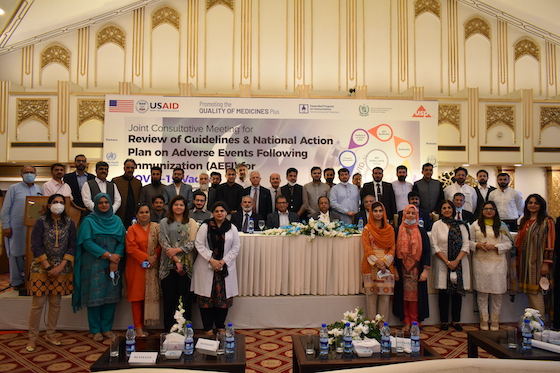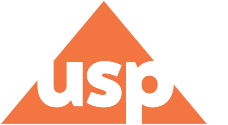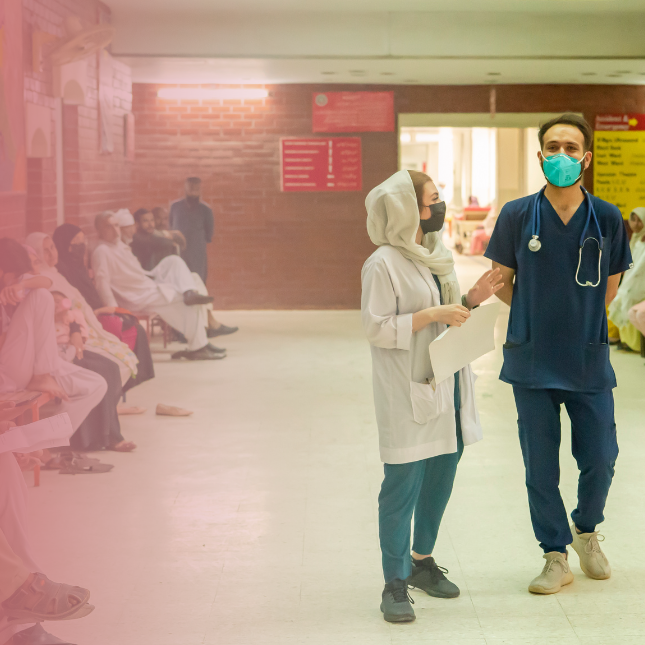When Pakistan launched its COVID-19 vaccination campaign in 2021, concerns loomed about the public’s acceptance of the new vaccines and their safety. As is the case with all vaccines, particularly new ones, it is critical to track and follow up on any adverse events following immunization (AEFI) to ensure public safety. According to the World Health Organization (WHO), AEFIs can range from minor side effects, such as vaccination site pain, to more serious events, like hospitalization, and can undermine confidence in a vaccine if not addressed quickly.
Strengthening pharmacovigilance for mass vaccinations
At the time, Pakistan’s pharmacovigilance program was not designed for a mass vaccination event, but rather to monitor the safety of children's vaccination campaigns. As a result, it needed to be substantially retooled in response to the COVID-19 pandemic. In particular, the Government of Pakistan reached out to private sector providers, who deliver most of the country’s health care, to help monitor and share timely information on COVID-19 vaccine safety.
To engage the private sector, the U.S. Agency for International Development (USAID), through PQM+ worked closely with the government to introduce a new intervention that meets the unprecedented safety surveillance requirements for COVID-19 vaccines.

Public and private reporting of adverse events
The Federal Directorate of Immunization (formerly the Expanded Program on Immunization), which is part of the Ministry of National Health Services, Regulations, and Coordination, oversaw the rollout of the national COVID-19 vaccine campaign. Before the pandemic, the Directorate implemented AEFI surveillance mechanisms for routine immunization for newborns and children younger than 5 years. The system reported data only from public sector health facilities and did not include information from private sector health facilities.
Including private sector data
In fact, most Pakistanis (82.5 percent) seek health services in the private sector, according to a 2021 study. Moreover, the COVID-19 mass vaccination drive included adults and the elderly, who often have pre-existing health concerns. Without private sector data, the surveillance system may have presented an incomplete picture of the risk of complications from COVID vaccinations.
As a first step, the USAID-funded PQM+ program and WHO held a joint consultative meeting with key stakeholders from both the public and private sectors, including the Federal Directorate of Immunization, to review the existing AEFI guidelines. They identified gaps, then developed and finalized the first National Action Plan and guidelines for AEFI surveillance for COVID-19 vaccines.
National action plan addresses pharmacovigilance
The Federal Ministry of Health approved the new National Action Plan and disseminated it to federal and provincial stakeholders for implementation in September 2022. The plan defines the roles and responsibilities of manufacturers, importers, regulators, and public and private health care providers. Previously, these roles were not clear, which led to challenges in coordination and reporting.
The USAID PQM+ program worked at the national level with the Drug Regulatory Authority of Pakistan (DRAP) to establish a Pharmacovigilance Risk Assessment Expert Committee to strengthen the Authority’s ability to conduct pharmacovigilance monitoring and improve the AEFI reporting system.
Mobilizing provincial partners
To ensure uptake of the new plan, USAID, through PQM+, coordinated with government partners across the health system. At the provincial level, PQM+ helped to revitalize the provincial AEFI committees, which had been dormant for years. The program also collaborated with four provincial health care commissions, which regulate public and private health facilities, to standardize the implementation of the new AEFI guidelines. At the facility level, PQM+ supported private hospitals to establish or revitalize AEFI committees. PQM+ trained 200 professionals from 130 private hospitals on the new guidelines and the need for timely reporting.
Better information management reduces errors
To facilitate the flow of continuous data for surveillance, PQM+ supported DRAP to create an AEFI interface within the Pakistan Integrated Regulatory Information Management System (PIRIMS). The interface allows for electronic transfer of AEFI data from Pakistan to VigiFlow, a web-based pharmacovigilance management system hosted by the WHO Collaborating Centre for International Drug Monitoring (i.e., the Uppsala Monitoring Centre). This has replaced manual entry into VigiFlow, which was time-consuming and carried the risk of human error. The new approach substantially increased the number of AEFIs entered into the system. Before this support, Pakistan had only started to submit polio vaccine AEFIs to VigiFlow. In the last quarter, more than 28,000 AEFI reports were uploaded to VigiFlow using the new interface, making Pakistan the second largest contributor of AEFI reports to VigiFlow in the WHO Eastern Mediterranean Region.
Engaging private partners improves safety monitoring
By engaging the private health sector, the Government of Pakistan now has a more complete picture of COVID vaccine-related AEFIs. Moreover, the new national AEFI system, which can be adapted for other vaccines, enables the government to monitor and report AEFI for all types of immunizations in Pakistan. The government is now better able to safeguard the public’s heath, thereby building the public’s confidence in life-saving medicines and vaccines, while sustainably strengthening the health system to weather future health crises.








